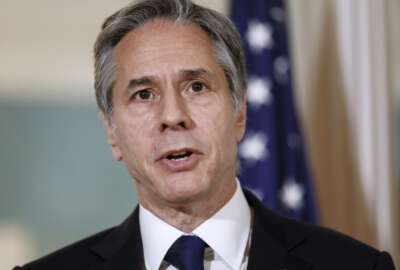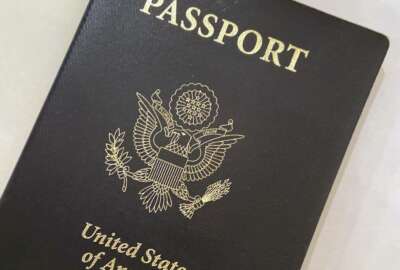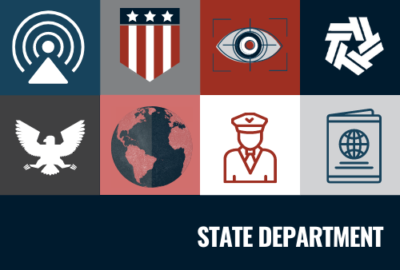State Dept. staffing surge won’t address passport backlog overnight, union warns
Lawmakers are pressing the State Department to move more aggressively to address a backlog of as many as 2 million pending passport applications.
Lawmakers are pressing the State Department to move more aggressively to address a backlog of as many as 2 million pending passport applications.
The department, under this backlog, is taking up to 18 weeks to process routine passport applications, and up to 12 weeks to handle expedited applications. Under both tracks, the department is allowing up to six weeks for mailing.
The National Federation of Federal Employees Local 1998, which represents passport services employees, said employees are struggling to dig out from the workload because of staffing shortages, combined with a renewed demand for international travel.
NFFE 1998 President Lee Wentz said the department’s “failure to maintain an acceptable level of trained staff,” combined with an inability for employees to telework during the COVID-19 pandemic has made it difficult to chip away at the backlog.
“In the end, this all boils down to staffing and technology, whether it’s the technology to be able to work from home or the technology to do more work with less people,” Wentz said in an interview.
Rachel Arndt, the deputy assistant secretary for passport services, told reporters in a briefing last week that the department is “surging back to pre-pandemic staffing levels,” with more than 150 employees returning to more than 21 passport agencies across the country.
The department, she added, is hiring additional government and contractor staff as COVID restrictions ease across the country, and expanding overtime at all locations.
Arndt said that as of July 12, passport agencies in 17 cities had all their staff returning, and that department expects another five agencies will soon completely reopen with their staff back in the office.
Wentz, however, said the vast majority of passport services employees are already back in the office working.
“There are still a few people out because of COVID protocols and health-related issues, but most of us have been back working,” he said.
In cases where pandemic restrictions have hampered reopening, Arndt said telework isn’t an option, because the work requires connectivity to systems and databases that are only accessible within department facilities.
“We’re trying to adjudicate on-site to help us safeguard the customers’ personally identifiable information and to ensure the integrity of the entire application process. So we’re maintaining very high standards of security and privacy protection for the customers, and we’re securing their sensitive documents like their birth certificates and naturalization certificates in our offices,” Arndt said.
NFFE 1998 pressed the issue of remote work with the State Department well before the pandemic, but in addition to privacy concerns, Wentz said it’s also a matter of the department not investing in modernizing its IT to support remote work.
“It’s always been more of a funding issue, is what we’ve been told,” he said.
Even with these measures in place, the department is warning that the impact on service will continue for months.
Arndt said individuals to submit a passport application now won’t get a new passport until “well into the fall,” and that people without passports looking to travel overseas this summer, “may need to make alternate travel plans.”
To avoid any potential conflicts, Arndt encouraged individuals to apply or renew their passports at least six months ahead of time.
The department, she added, has “extremely limited” appointments for customers who have urgent international travel within 72 hours, for reasons other than life-or-death emergencies.
Amid these delays, House and Senate lawmakers are pressing the State Department to do more to address the long wait times, and to loop Congress in on plans to address the backlog.
House lawmakers on Thursday reintroduced the Bipartisan Passport Backlog Elimination Act, which would require Secretary of State Antony Blinken to submit a plan to Congress on how the department eliminate the passport backlog within 30 days of the legislation passing.
After submitting the plan to Congress, the department would have 30 days to reduce processing times to 6-8 weeks for standard applications and 2-3 weeks for expedited applications.
The bill would also require the State Department inspector general to audit the effectiveness of the plan to eliminate the backlog.
House Oversight and Reform Committee Chairwoman Carolyn Maloney (D-N.Y.) said she’s heard from hundreds of constituents “currently stuck without a valid passport.”
“The State Department needs to be transparent about its plans to process these outstanding passport applications and demonstrate that they are doing everything possible to eliminate this backlog,” Maloney said.
Rep. Gerry Connolly (D-Va.), chairman of the government operations subcommittee, said too many constituents have been “left in limbo, not sure if they will receive their passport in time,” and in some cases have had to forego travel.
“While I appreciate the efforts of State Department employees as they work to reduce this backlog, the need for substantial improvement remains,” Connolly wrote.
Reps. Adam Kinzinger (R-Ill), and Rep. Tim Burchett (R-Tenn.) also introduced the bill.
Sen. Chris Murphy (D-Conn.) wrote to Blinken urging the department to outline a timeline for the department’s hiring strategy, as well any funding needed to support overtime and contractor costs.
Sen. James Lankford (R-Okla.), in his own letter to Blinken, said the department no longer posts the size of the passport backlog on its website, which it did under the Trump administration last year.
Lankford said he worked closely with former Secretary of State Mike Pompeo to address a passport backlog of 1.7 million applications in June 2020. Pompeo designed passport services employees as mission-critical and as part of the department’s reopening strategy.
“Since I worked closely with the previous Administration to remedy this same problem last summer, I am disappointed to learn that the Department’s progress has backslid to such a stark extent,” Lankford wrote.
While passport processing times returned back to normal in fall 2020, Wentz said a recent surge in international travel led to an “unprecedented amount of applications in a very short period of time.”
The department, he added, has primarily dealt with backlogs in the past by increasing staffing, but added it will take time for new employees to get up to speed.
“As in most cases, you can’t staff up and expect the situation to be resolved overnight,” Wentz said,
Copyright © 2025 Federal News Network. All rights reserved. This website is not intended for users located within the European Economic Area.
Jory Heckman is a reporter at Federal News Network covering U.S. Postal Service, IRS, big data and technology issues.
Follow @jheckmanWFED






